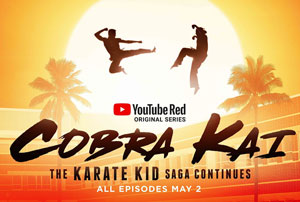The 2010s are the decade when the word “canceled” became softened and pretty much any old fondly remembered thing could be brought back (for better or worse). “Cobra Kai” – Season 1 of which aired in May 2018 on YouTube Premium – may or may not have been the most surprising revival, continuing from the “Karate Kid” trilogy (1984-89). But it is surprising that it’s this good.
Who’s the good guy?
The 10-episode “Cobra Kai” Season 1 springs from the theory – nicely outlined in J. Matthew Turner’s 2015 YouTube video – that “The Karate Kid” (1984) serves up protagonist bias in favor of Daniel (Ralph Macchio), and that if one takes a moment to look at things from the perspective of Johnny (William Zabka), the hero-villain dichotomy collapses. “Cobra Kai” does give us a lot of Johnny’s POV, and because of that, we no longer need an explanatory video to see that he’s not a villain.
But neither is Daniel, and that’s why the modern-day “Cobra Kai” is a richer story than its backstory in “The Karate Kid” (and the first part of “The Karate Kid Part II,” when Sensei Kreese breaks Johnny’s runner-up trophy and nearly kills him before Mr. Miyagi steps in).

“Cobra Kai” Season 1 (2018)
10 episodes, YouTube Premium
Creators: Josh Heald, Jon Hurwitz, Hayden Schlossberg
Stars: Ralph Macchio, William Zabka, Courtney Henggeler
Macchio – and Daniel, by extension — has grown into the bravado that seemed jarring when he was a teen; now it plays just right. Daniel has a successful car dealership, a perfect wife (Courtney Henggeler’s Amanda) and a good daughter (Mary Mouser’s Samantha) who did some karate with her dad before she moved on to other things as teenagers are known to do.
Johnny is a hilarious portrayal of a sad sack. Cleaning his apartment consists of sweeping beer cans and bottles off of all flat surfaces using the length of his arm. Johnny being stuck in the 1980s is a great running gag, even if it stretches believability. He’s never heard of Facebook, and he listens to music via cassette tapes on a boom box. Most absurdly, he says his dojo’s website is “W-W-W, period, Cobra Kai, period, C-O-M.”
Naturally funny
“Cobra Kai” is naturally funny. It’s in the same style as the 1980s films, but what was earnest (or a genuine attempt at earnestness) under the pen of Robert Mark Kamen can’t help but play as funny under a writing team led by Josh Heald, Jon Hurwitz and Hayden Schlossberg. They were kids in the 1980s and no doubt rented the “Karate Kid” films many times from the video store.
It must be a blast to write for this show, especially the scenes wherein Johnny teaches his new crop of Cobra Kai students. Without any sense of irony, he defends his dojo to the karate tournament board with: “It’s a place where kids won’t get picked on just because they’re a bunch of losers.”

Johnny is no Mr. Miyagi, but he’s a great sensei in his own way. He doesn’t “give a sh—” what method his student uses to wash windows (one of a couple callbacks to “wax on, wax off”). And every time a viewer wants Johnny to apologize to a student for being too mean, he doesn’t, and in the long run, we understand he’s toughening them up.
It doesn’t ring quite true that two 50-something guys are obsessed with a karate match from when they were teenagers (the one Daniel won with a crane kick of dubious legality), yet within the context of this universe, it’s true enough. “Cobra Kai” knows it’s silly while also playing everything completely straight, and that’s exactly the right tonal choice.
The writers take any opportunity to lean into clichés as if they are the first ones to think of them. As a result, we get extreme Mean Girls, who make a viral video of Aisha (Nichole Brown) eating Cheetos with a pig cartoon overlay. And nerd Eli (Jacob Bertrand) transforms into badass Hawk off screen by getting a Mohawk and a tattoo, and he immediately lands one of the hot Mean Girls. And the friends of Robby (Tanner Buchanan) think he’s lame for getting a job rather than making his money through theft, as they’ve always done.
Core theme remains in place
The core “Karate Kid” theme – learning karate and confidence, and then fighting back against bullies – is very much present, but “Cobra Kai” has so much more nuance than the films. Just as Daniel and Johnny are not purely good or bad, the same goes for their students, Cobra Kai’s Miguel (Xolo Maridueña) and Miyagi-do’s Robby.
I’m reminded of the tone of “Degrassi” or “Afterschool Specials” when issues such as bullying or first dates play out. Yet it’s clear the target audience for “Cobra Kai” is people who enjoyed the “Karate Kid” films as kids without irony (and then still appreciated them later while recognizing they are objectively flawed).
For one thing, Johnny – despite his absurd tech laggardness – is the audience surrogate, blanching at Miguel’s Gen-Z tidbits about things like “genderizing.” Johnny spray-paints a billboard in such a way that it calls for an “American Vandal” crossover, swears as much as he drinks, and has his students casually using the word “p—y” (as in “wimp”) after a few lessons.
Gen-Zers make up a lot of the cast of characters, but they live in Johnny’s and Daniel’s Gen-X world. “Cobra Kai” – of which April’s Season 2 is currently being rolled out free-with-ads (a new episode comes out every Wednesday) — is nostalgic, ridiculous and genuine. Not only does it have a reason to exist, but it elevates the “Karate Kid” saga into something with multi-layered substance. That’s a feat more impressive than a championship-winning crane kick.

